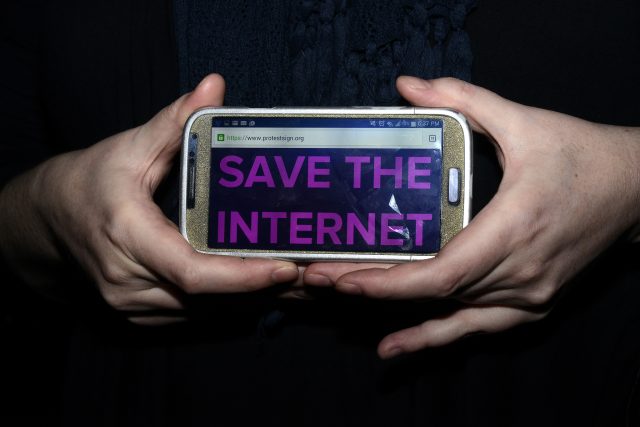
Senators Al Franken (D-Minn.) and Edward Markey (D-Mass.) today said they will try to preserve the Federal Communications Commission's net neutrality rules in a budget standoff with Republicans.
A Republican budget proposal that came out in June would prevent the FCC from enforcing its net neutrality rules until Internet providers who are suing the commission have exhausted all their legal options.
"ISPs are certainly free to file their suits but until they prevail, and I don’t believe they will, there is no basis for Republicans blocking the FCC from doing its job," Franken said in a press conference today.
ISPs previously petitioned a federal appeals court for a stay that would delay implementation of the rules until the legal case is decided. The court refused to issue a stay, allowing the net neutrality rules to take effect on June 12. But the Republican budget proposal for fiscal 2016 would prohibit implementation of the rules until the court cases are over.
The White House urged Republicans to pass the budget without "unrelated ideological provisions," such as the net neutrality prohibition. Franken and Markey said they plan to make sure the budget as passed by Congress doesn't include the net neutrality ban, but President Obama could veto the budget if Democrats lose the battle.
"I think the president should veto it, I think the president will veto it," Markey said. "This is a central economic growth issue for this administration."
To make sure it doesn't get to that point, Markey said, "we will have to organize as Democrats to block this rider and any other riders the Republicans seek to attach to the appropriations process. Net neutrality is at the top of the list."
The FCC's net neutrality order reclassified broadband providers as common carriers and issued prohibitions on blocking or throttling traffic or giving priority to Web services in exchange for payment.
The budget proposal from House Republicans says that "none of the funds made available" to the FCC may be used to implement net neutrality rules until "there has been a final disposition" on the court cases pitting ISPs vs the FCC.
The House and Senate proposals also prohibit the FCC from "directly or indirectly" regulating the prices and terms charged and imposed by broadband providers. This prohibition would remain in place even after the court cases are decided. The FCC hasn't regulated the prices charged by ISPs, but Franken said a prohibition on "indirect" regulation could block the FCC's ban on paid prioritization.
Budget negotiations are ongoing.
Republicans in Congress have made numerous proposals throughout this year to eliminate net neutrality rules and limit the FCC's power to regulate broadband providers. Republicans have claimed that the FCC is imposing "heavy-handed agency regulations that would slow Internet speeds, increase consumer prices and hamper infrastructure development," and that the rules must be stopped to "protect our innovators from these job-killing regulations.”
Franken argued that "net neutrality lets small businesses or individuals play on a level playing field with giant corporations." He gave the example of YouTube, saying that "before YouTube there was Google Video and Google Video wasn't very good... because of net neutrality, YouTube was able to get to you, you were able to get to YouTube at the same speed as Google Video. YouTube was better… Google bought YouTube for $1.6 billion." Net neutrality rules are about protecting "the next YouTube," he said.
There weren't any net neutrality rules in place when YouTube was created in 2005. When asked why net neutrality rules are needed now if YouTube thrived without them, Markey argued that there were "de facto" net neutrality rules stemming from principles outlined by former FCC chairmen such as Michael Powell. Powell in 2004 urged the broadband industry to preserve "Internet freedoms" including the "freedom to access content" and "freedom to use applications." (Powell is now a cable lobbyist and critic of the FCC's latest net neutrality rules.)
Net neutrality rules were first formalized by the FCC in 2010, a few years after Comcast was caught interfering with BitTorrent traffic. Verizon sued and was able to overturn a major portion of the rules, leading to another net neutrality rulemaking this year.
"What we're talking about now is formalizing what was the de facto environment," Markey said. "There have never been Internet fast lanes and slow lanes. Now the FCC has formally made the rules, and broadband companies want the rules to be undone."
reader comments
192